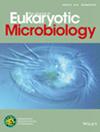无孢子虫(Opisthosporidia)营养细胞融合与生命周期新阶段
IF 2.1
4区 生物学
Q3 MICROBIOLOGY
引用次数: 1
摘要
拟蚜类是藻类的胞内寄生物,在分子系统发育树上是真菌的姊妹种。它们与真菌有着共同的祖先,在这些纯菌科的进化过程中非常重要。蚜虫的生命周期表面上与壶菌相似,目前还没有得到充分的研究。我们在蚜虫中发现了一个新的阶段——大的多鞭毛和变形虫细胞,它是由一种有两种细胞核的疟原虫在营养期融合后形成的。本文还讨论了参与拟南芥营养细胞融合的蛋白编码基因家族。本文章由计算机程序翻译,如有差异,请以英文原文为准。
Vegetative cell fusion and a new stage in the life cycle of the Aphelida (Opisthosporidia)
The aphelids, intracellular parasitoids of algae, represent a large cluster of species sister to Fungi in molecular phylogenetic trees. Sharing a common ancestor with Fungi, they are very important in terms of evolution of these groups of Holomycota. Aphelid life cycle being superficially similar to that of Chytridiomycetes is understudied. We have found in the aphelids a new stage—big multiflagellar and amoeboid cells, formed from a plasmodium that has two sorts of nuclei after trophic stage fusion. The families of protein-coding genes involved in the vegetative cell fusion in Opisthokonta were also discussed.
求助全文
通过发布文献求助,成功后即可免费获取论文全文。
去求助
来源期刊
CiteScore
4.30
自引率
4.50%
发文量
85
审稿时长
6-12 weeks
期刊介绍:
The Journal of Eukaryotic Microbiology publishes original research on protists, including lower algae and fungi. Articles are published covering all aspects of these organisms, including their behavior, biochemistry, cell biology, chemotherapy, development, ecology, evolution, genetics, molecular biology, morphogenetics, parasitology, systematics, and ultrastructure.

 求助内容:
求助内容: 应助结果提醒方式:
应助结果提醒方式:


